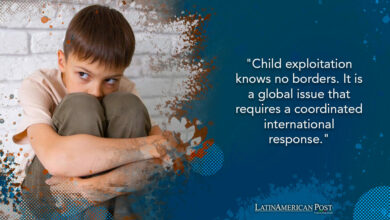What are the projections for the economy in Latin America?
The OECD Development Center, ECLAC, the Development Bank of Latin America and the European Union warn of the economic situation in the region, and the projections for the economy in Latin America .

A new year is approaching and with it the planning of the countries to define goals and budgets, in the midst of one of the most difficult crises that humanity has experienced. Photo: Adobe Stock
LatinAmerican Post | María Fernanda Ramirez Ramos
Listen to this article
Leer en español: ¿Cuáles son las proyecciones para la economía en Latinoamérica?
A new year is approaching and with it countries define goals and budgets, in the midst of one of the most difficult crises that humanity has experienced. In this regard, this report entitled "Latin American Economic Outlook: Moving Towards a Better Recovery Together" analyzes the situation and offers recommendations to governments to achieve solid, sustainable and inclusive economic growth.
The report emphasizes three themes: digital transformation; gender approach; and climate change, green recovery, and sustainability. Likewise, it points out how the Covid-19 crisis showed the need to work in a coordinated and cooperative manner to face development challenges and achieve a regional and global recovery.
Highlights
The gross domestic product (GDP) of the Latin American and Caribbean region contracted by around 7.0%. Most worryingly, it is not projected to reach pre-crisis GDP per capita levels until 2023-2024, and everything is subject to the development of Covid-19. For this reason, rapidly increasing vaccination levels is one of the main challenges.
On the other hand, the poverty rate rose 3 percentage points, reaching 33.7%, while the extreme poverty rate now reaches 12.5%. These results had not been achieved in the last 12 and 20 years respectively. In addition, the Gini Coefficient, which measures inequality, increased by 2.9%, keeping the region as the most unequal in the world.
Also read: AMLO's Proposal Against Extreme Poverty Is Not As Utopian As It Seems
Another warning area for the region is employment, since practically half of the population, 45% of households, depend on informal employment. Likewise, the average income of the population has decreased: “the number of people with low-middle income decreased by 7 million, the number of people with middle income decreased by 13 million (13.1%), the number of people with middle-income high income decreased by 4 million (14.2%), and the number of people with high income decreased by 2 million (10.5%) ”.
A new social contract is urgent
Although the crisis caused by the pandemic has impacted various sectors, the most affected have been vulnerable groups, especially women, youth and migrants. The report's recommendations state that “rethinking the social contract to restore trust and empower citizens at all stages of the public policy-making process” is essential.
En este nuevo episodio de Eco Talks????️los expertos de #Latam @OECDeconomy analizan los datos y presentan los pronósticos del desempeño económico de Latam y las 6⃣grandes economías ????????????????????????????????????????????????que abarcan alrededor del 85% del PIB de la región.
????https://t.co/zvXGcVuePa— OECD Economics (@OECDeconomy) December 6, 2021
However, making a reform to the social contract implies having more inclusive social policies and fiscal reforms, with consensus among the different groups of the population, to impact the general well-being of the population. This should translate into higher quality public services, better job opportunities, greater intergenerational integration and fewer territorial gaps, between urban and rural areas.
Likewise, the report points out the need to have great citizen consensus, since there is a general distrust of the population towards the institutions. This will be a great challenge in the region, since as recent elections and events in regional politics have shown, most countries are politically divided and highly polarized. Likewise, extreme movements are re-emerging with force, either from the right or the left, which can be questioned for their radical positions.
On the other hand, countries that during the last year demonstrated high nonconformity and social discontent through protests, such as Chile or Colombia, are on the verge of electing a new government. This will also define the path that nations will follow: migration, inclusion of historically marginalized peoples, and rural reforms are at stake.
In addition, there will also be electoral processes, of different instances, in Mexico, Brazil, Peru and Costa Rica. This has an effect on foreign investment, which tends to act moderately in the middle of electoral processes. In this way, it could be said that the economy will be in a period of recovery and slow growth, but it needs to have a boost from the most productive sectors, implementation of green policies for the future and regional alignment in search of cooperation to face joint challenges.





